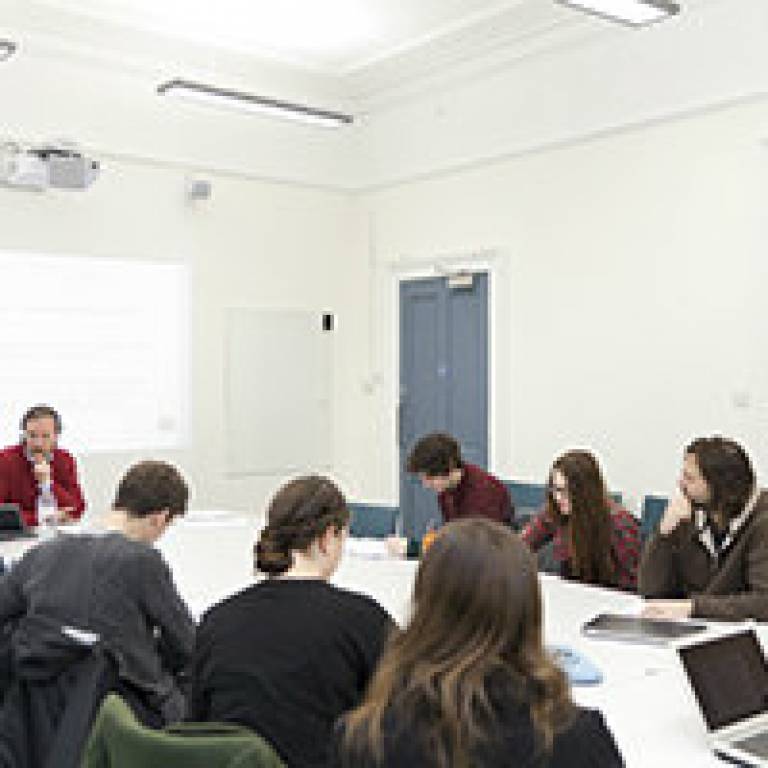Provost's View 17/10/2013: Our interdisciplinary culture
17 October 2013
My journey around UCL continues to astound me and my willingness to learn about the organisation by being 'out and about' ─ both seeing and listening ─ seems to be going down well.

My intention in the first round of visits to faculties and services was primarily to meet the next tier of individuals in leadership positions in each part of the university, but inevitably the journey has been much more instructive than just that.
Firstly, the academic quality of the institution is
immediately apparent as judged by a combination of the work and ideas that have
been presented to me. It has been very pleasing to hear, in the past week, that
we will be submitting in excess of 2,100 individuals (nearly 95% of our
eligible staff) as research active in the Research Excellence Framework (REF)
2014, with the vast majority of research outputs judged to be at the 3* or 4*
level.
I have also found great collegiality, high levels of personal, disciplinary and institutional ambition, and a strong desire to work across disciplinary boundaries in both research and education. In fact, I would go so far as to say that interdisciplinarity is engrained within the culture of UCL and that it underlies much of our recent research success, as well as driving new programmes of both undergraduate and postgraduate education, most notably the Arts and Sciences BASc.
I have been trying to analyse why UCL is so good at interdisciplinary activities.My conclusion is that it is fostered by our history of making it easy to work across the relatively low walls of our many departments, and also by our strong willingness to work with external partners. Although I have joked that interdisciplinary working is made easier by the relative opacity (to a newcomer!) of our financial system, there is an element of truth in the observation that no one is deterred from developing interdisciplinary activities for financial reasons. The same is not true in all universities.
My journey has also continued to educate me about the good, the bad and the ugly of our estate - although now I think about it, some of the good may not have been ours! Last week, I gave the opening lecture of the year (entitled 'World-class Universities ─ Predicting their Future') to the Institute of Neurology in the wonderfully appointed lecture theatre in the Clinical Neuroscience Centre at 33 Queen Square (below right). I have also been impressed with the standard of refurbished departmental accommodation in Central House, Drayton House and Gordon Square (Institute of the Americas, above right).
Joining my list of those in need of serious attention are Women's Health in Chenies Mews, History on Gordon Square, and Science, Technology, Engineering & Public Policy (STEaPP) at 66─72 Gower St. I have now been to visit nine of our ten faculties, with only Laws to go, so surely there can't be too much more about our estate to concern me. However, I am about to visit all of the services too, so perhaps that statement is premature.
I have also discovered the joys of UCL in the subterranean world of Bloomsbury. Until I visited Engineering, I had no idea that some of our buildings go underground for some three floors, right in the heart of the campus. Some of the advanced facilities and labs that I saw there were of world-class quality and now I know what is underneath it (the Institute of Biochemical Engineering), I will view the Japanese Garden in a new light.
As I write this article, some 1,014 people have now watched the YouTube version of my Lunch Hour Lecture, as well as the nearly 500 that saw it live in the UCL Bloomsbury Theatre and many more that watched as it was streamed online. I promise you that only three of the 1,014 viewings have come from me! It was a thoroughly enjoyable experience to begin to lay out a vision for the future and to then to answer your questions; some of which were quite rightly reasonably tough and searching.
At the very beginning of the lecture I used the first person plural quite deliberately, when I described the prospective future as 'our' vision of London's Global University. I want you to hold that thought; and in the next Provost's View, I will describe to you what else has been shaping my thinking, what I intend will happen next, and where you will have your opportunity to contribute.
Professor Michael Arthur
UCL President & Provost
 Close
Close

